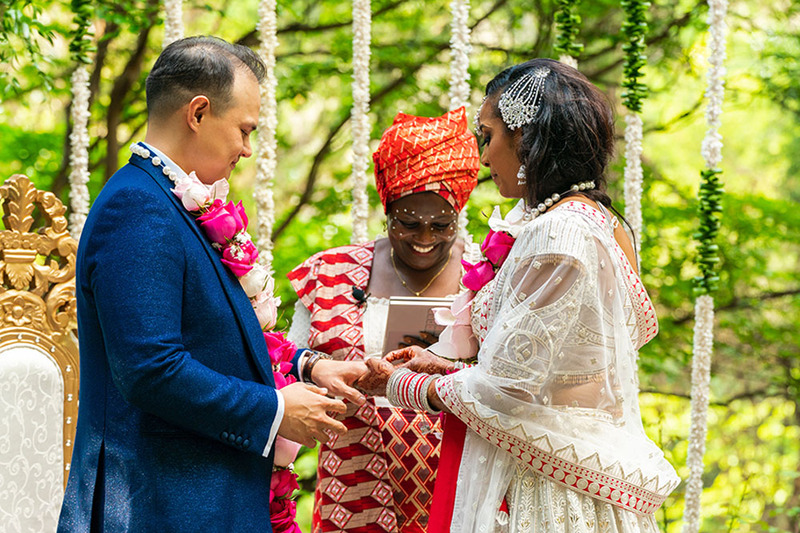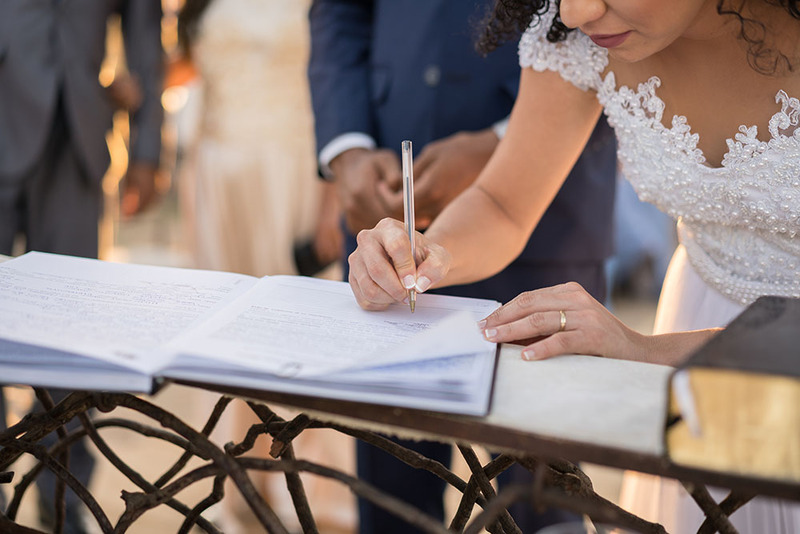AMERICAN WEDDINGS BLOG
Stay up to date with the latest wedding ceremony trends, script writing inspiration, tips and advice for first-time officiants, and news that matters to couples and wedding ministers.
Stay up to date with the latest wedding ceremony trends, script writing inspiration, tips and advice for first-time officiants, and news that matters to couples and wedding ministers.
Published Thursday, Jan. 9th, 2025
Last updated Tuesday, Jun. 24th, 2025

As the new year begins, let’s take a look at some of the marriage laws that might be changing in states around the country. This proposed marriage legislation could affect same-sex marriage rights, child marriage laws (age of constent to marry), and more.
This isn’t a complete list; new legislation will continue to be introduced in the months to come. We’ll continue to keep you updated on the legislation that’s most likely to impact wedding officiants in each state, as well as the couples they serve and marry.
(Edit: Did Pass / Signed by Governor 4/7/2025)
To repeal an unconstitutional statutory ban on same-sex marriage
Lawmakers in Colorado want to amend the state laws to recognize and protect legal same-sex marriages in the state. This would protect marriage equality at the state level in CO, even if federal protections are reversed in the future. Currently, there are several (unenforceable) sections of Colorado law that limit marriage to unions between one man and one woman.
Sponsor/s: Senators Jeff Bridges [D], Lisa Cutter [D], Janice Marchman [D], Dafna Michaelson Jenet [D], Dylan Roberts [D]; and Representatives Andrew Boesenecker [D], Kyle Brown [D], Sean Camacho [D], Chad Clifford [D], Cecelia Espenoza [D], Lindsay Gilchrist [D], Javier Mabrey [D], Jacqueline Phillips [D], Manny Rutinel [D], Rebekah Stewart [D], Elizabeth Velasco [D], Jenny Willford [D], Steven Woodrow [D]
Related: Honoring Clela Rorex: Gay Rights Hero Issued First Same-Sex Marriage Licenses in Colorado
(Edit: Did not pass / Engrossed; Died in State Affairs Committee 1/27/25)
A resolution asking the US Supreme Court to reverse their ruling in Obergefell v Hodges and overturn federal same-sex marriage protections
Previous update: Passed House (See what that means in this article by Them: Idaho House Passes Resolution Urging SCOTUS to Overturn Obergefell v. Hodges)
Idaho lawmakers have introduced a resolution calling on the Supreme Court to overturn their ruling in the case that legalized same-sex marriages across the country (Obergefell v. Hodges). Lawmakers claim the decision violates states rights, and the state’s ability to make its own laws regarding marriage.
Resolutions like this do not carry the weight of law; they voice an opinion on current laws and important social issues. If this were to pass in both chambers, it would be sent to the Supreme Court, where it would be viewed as the opinion of state legislators.
Although this is not a proposed law, it’s a dangerous message, and one of many recent attacks against marriage equality. This resolution represents a growing risk to the marriage rights of same-sex LGBTQ+ couples and their families.
Sponsor/s: House State Affairs Committee Committee
Related: What Wedding Officiants Should Know About Project 2025 & Gay Marriage
(Edit: Did not pass)
To repeal a defunct same-sex marriage ban from the state's constitution
In response to recent threats to marriage equality (including Idaho HJM 001), legislators in Idaho have introduced a resolution to protect marriage rights in the state by repealing a defunct same-sex marriage ban from the state constituion. If this resolution passes, the matter will be added to the ballot and voters in the state will be allowed to vote on the amendment.
Sponsor/s: Representative Ilana Rubel [D]
To repeal a defunct same-sex marriage ban from the state’s laws
Florida lawmakers hope to repeal an outdated (an unenforceable) law which says same-sex marriages cannot be legally recognized in the state, and that defines legal marriage as existing only between opposite-sex partners.
Repealing this law would help protect marriage equality at the state level if federal protections for same-sex marriages are ever reversed. This defunct law also contradicts the 2022 Respect for Marriage Act, which requires all states to recognize a same-sex marriage that has been legally entered into in another state.
Sponsor/s: Senator Tina Polsky [D]
(Edit: Did not pass / Died in State Government Finance and Policy Committee)
To amend the state constitution and declare marriage a fundamental right (one that can't be restricted by gender or race)
Minnesota lawmakers hope to protect marriage equality for same-gender couples and interracial couples in their state by amending the state's constitution. If this measure is passed, the amendment would be added to the 2026 general election ballot for residents to vote for or against.
Primary Sponsor/s: Representatives Athena Hollins [D]
(Edit: Did not pass / Died in Judiciary Committee)
Proposing ballot measures to repeal a same-sex marriage ban from the state's constitution & add language protecting the right to marry regardless of gender or race
If these resolutions pass, voters in Nebraska will be allowed to decide whether or not to remove a defunct same-sex marriage ban from the state's constitution, and to add new language protecting marriage rights regardless of gender or race. This would strengthen protections for interracial marriage and same-sex marraige at the state-level, even if federal protections are reversed.
Sponsor/s for LR5CA Senator Machaela Cavanaugh [N]
Sponsor/s for LR6CA: Senator Machaela Cavanaugh [N]
(Edit: Did pass 3/24/25 [first consideration])
A resolution calling to repeal a same-sex marriage ban from the state’s constitution and to add explicit protections for marriage equality
Legislators in Virginia have introduced a resolution calling for amendments to the state’s constitution, which would repeal a defunct (unenforceable) ban on same-sex marriages, and add new language that explicitly protects the right for adults to marry regardless of sex, gender, or race.
Amending the state’s constitution would protect marriage equality at the state level if federal protections for same-sex marriages are ever reversed. Lawmakers repealed a statutory same-sex marriage ban in 2020, but the constitutional ban remains.
Sponsor/s: Senator Adam Ebbin [D] ; Senator Ghazala Hashmi [D]
Read about previous efforts to repeal same-sex marriage bans in Florida and Virginia: (2022) Lawmakers in Florida and Virginia take steps to codify same-sex marriage
(Edit: Did not pass)
A resolution asking the US Supreme Court to reverse their ruling in Obergefell v Hodges and overturn federal same-sex marriage protections
Similar to a resolution passed in Idaho, lawmakers in South Dakota have introduced legislation "Urging the Supreme Court of the United States to establish marriage as between a man and a woman," and asking them to overturn federal protections for same-sex marriage (established in 2015 by Obergefell v Hodges).
As mentioned above, resolutions like this do not carry the weight of law; they voice an opinion on current laws and important social issues. If this were to pass in both chambers, it would be sent to the Supreme Court, where it would be viewed as the opinion of state legislators.
Although this is not a proposed law, it’s a dangerous message, and one of many recent attacks against marriage equality. This resolution represents a growing risk to the marriage rights of same-sex LGBTQ+ couples and their families.
Sponsor: Representative Tony Randolph [R]

Lawmakers in Idaho are calling for the Supreme Court to reverse it's landmark ruling in Obergefell v Hodges, which legalized same-sex marriage across the country in 2015. Meanwhile, lawmakers in Virginia and Florida seek to strengthen state-level protections for LGBTQ+ and interracial marriage. (Photo: Tempura / iStock)
(Edit: Did not pass)
To recognize additional clergy who can officiate a marriage ceremony in Texas
This bill would add several types of clergy to the list of people who can legally officiate a wedding in Texas, such as a Buddhist monk or priest, a Hindu pundit, a Muslim imam, and a Sikh granthi. It also clarifies the authority of a “person who is authorized by a religious organization to conduct a marriage ceremony.”
This legislation wouldn’t impact online-ordained ministers (including AMM Ministers); it clarifies the diversity of clergy who perform weddings in Texas.
|* ordination-button *|

Laws that help celebrate and protect the diversity of faith and marriage traditions ensure that all couples are able to have the ceremony they want -- a wedding that represents their values, their cultures, and what makes their love special. (Photo: Carsten Vollrath)
To secure the rights and dignity of marriage for Disabled Adult Children (to allow Disabled Adults to marry without losing their benefits)
As of Feb. 18, 2025, legislative text has not been received for H.R.1389, but previous legislation suggests this bill would allow certain Disabled Adult Children to marry without losing their SSI or SSDI benefits, medical and financial benefits which they require to live, and to enjoy healthy and meaningful lives. Legislative text is made available by the Government Publishing Office (GPO) to the public and the Library of Congress as soon as possible, but delays can occur. Visit the page linked above to see if updates are available.
Sponsor: Rep. Panetta, Jimmy [D-CA-19]
See AMM's previous support and coverage of protecting marriage rights for disabled adults:
(Edit: Did not pass)
To allow weddings to be witnessed and solemnized online (to make online weddings legal in New Mexico state)
Lawmakers in New Mexico want to allow online weddings, so that couples can meet with a wedding officiant and get married remotely using "telecommunication" technology (for example Zoom, Skype, or Google Meet). If passed, wedding officiants could officiate a wedding remotely( as long as they are physically located within New Mexico at the time), and witnesses could attend the wedding virtually as well.
Sponsor/s: Representative Tara Lujan [D]
To allow weddings to be witnessed and solemnized online (to make online weddings legal in New York state)
Lawmakers in New York want to add provisions for online weddings to state laws, so that couples can meet with a wedding officiant and get married remotely using audio-visual technology (like Zoom, Skype, or Google Meet). In the early years of the COVID-19 pandemic, online weddings were made legal temporarily by emergency order, and were very popular at that time. If passed, wedding officiants could once again meet with couples virtually to perform their marriage ceremony, and witnesses could attend the wedding virtually as well.
Sponsor/s: Assemblymember Linda Rosenthal [D]; Assemblymember Robert Carroll [D]; Assemblymember Stefani Zinerman [D]; Assemblymember Jennifer Lunsford [D]
(Edit: Did not pass)
To remove exceptions for child marriage, make legal marriage age 18 years old
Lawmakers in Kansas want to remove the legal exceptions that allow children as young as 15 years old to marry. Currently, children ages 15 to 17 can marry with judicial approval (age 15), or parental / guardian permission (ages 16 or 17). If passed, all parties to a marriage in Kansas would have to be at least 18 years old, without exceptions.
Sponsor: Representative Stephanie Clayton [D]
(Edit: Did not pass / Died in Judiciary Committee 2/04/25)
To lower the legal marriage age to 18 years old (from 21 years old)
Lawmakers in Mississippi want to lower the general age of consent to marry to 18 years old (which is the typical age already in many states). Currently, girls who are 15 years old can be married with parental consent in MS, while boys must be at least 17 years old with parental consent, and anyone under 21 years old must have parental consent to marry in Mississippi (which is the state's age of majority, or legal age of adulthood).
Sponsor/s: Representative Bryant Clark [D]
(Edit: Did not pass)
To raise the legal marriage age to 18 years old, with exceptions for emancipated minors who are at least 16 years old (provided their partner is not yet 21 years old or older)
Lawmakers in Missouri introduced a bill that would ban child marriage in the state, with some exceptions in place for emancipated minors who are at least 16 years old. In these cases, emancipated minors could marry, provided that the other party is no older than 20 years old. Currently, children who are 16 or 17 can marry in MO with parental consent, if their partner is not 21 years old or older.
Sponsor/s: Representative Wendy Hausman [R]
(Edit: Did not pass)
To raise the legal marriage age to 18 years old, without exceptions
Similar to the legislation above, this bill would raise the legal age of marriage from 16 to 18 in Missouri. There would be no exceptions for emancipated minors.
See AMM’s previous coverage: Missouri Lawmakers Consider Raising Marriage Age to 18 in 2025
Sponsor/s: Senator Tracy McCreery [D]
(Edit: Did not pass / Bill killed 5/15/25)
To allow 17 year olds to marry when either party to the marriage is active duty military
This bill would lower the legal marriage age to 17 years old in New Hampshire, if one of the people getting married is an active duty member of the military. New Hampshire raised it's legal marriage age to 18 years old last year (with no exceptions), and that new law went into effect on Jan 1st, 2025. This bill would partially roll that back, allowing some minors to marry if they or their partner is in the military.
See AMM's previous coverage: New Hampshire Child Marriage Ban in Effect in 2025
(Edit: Did not pass)
To remove any exceptions from the law that allow children to marry
Lawmakers in Oklahoma want to remove exceptions from the law that allow children. Currently, children of any age can marry in OK with judicial approval if certain conditions are met (there is no minimum age for marriage), and children between the ages of 16 and 18 can marry with a guardian or parent's permission.
Sponsor/s: Senator Warren Hamilton [R]
(Edit: HB1141 Did not pass) A similar bill under consideration this year, Oklahoma HB 1141, would modify current laws to allow children who are 16 or 17 years old to marry with judicial consent only. (Repealing a law that allows children to marry with parental consent.)
(Edit: Did pass 6/6/25 / Effective date, January 1, 2026)
To raise the legal marriage age to 18 years old in Oregon
Read our coverage: Oregon Lawmakers Ban Child Marriage, Raise Marrying Age to 18
This bill would increase the legal age of consent to marry to 18 years old in OR. Currently, 17 year olds can get married in Oregon with permission from a parent or guardian.
Sponsor/s: Senator Janeen Sollman [D], Senator David Smith [R], Representative Kevin Mannix [R]; and others
(Edit: Did not pass)
To raise the legal age of marriage to 18 years old, without exceptions
Lawmakers in South Carolina hope to raise the legal age to marry from 16 years old to 18 years old. Currently, children as young as 16 who live with a parent or guardian can get married if they have that parent or guardian’s permission.
Sponsor/s: Senator Bradley Hutto [D]
(Edit: Did not pass)
To raise the legal age of marriage to 18 years old, without exceptions
Lawmakers in South Dakota have introduced legislation that would repeal the laws that allow children who are 16 and 17 years old to marry if they have a parent or guardian's permission. This would make the legal age of marriage in South Dakota 18 years old, without exceptions.
Sponsor: Representative Tony Randolph [R]
(Edit: Did not pass)
To eliminate exceptions to the law that allow emancipated minors to get married in Texas
Lawmakers in Texas have introduced legislation that would prohibit emancipated minors from getting married in Texas (the only circumstance in which children can legally marry there). This would make 18 years old the legal age of marriage in Texas, without exception.
Sponsor/s: Representative Jon Rosenthal [D]

Lawmakers in Missouri, South Carolina, and Texas are reconsidering the marriage of minors. Raising the minimum age to marry can help protect children from abuse and other negative outcome. (Photo: Dmytro Loboda / iStock)
(Edit: Did not pass)
To require couples to complete a premarital conflict resolution class before they can get married
Alabama lawmakers hope to pass a new law that would require all couples to attend premarital conflict resolution class before they can apply for a marriage license. Those in favor of the legislation hope that it will reduce domestic violence in the state.
So far, the bill doesn’t contain information on how much this class would cost, whether discounts would be available to low-income couples, or how many hours they would need to attend.
Sponsor/s: Senator Rodger Smitherman [D]
(Edit: Did pass 5/27/25 [passed to be enacted / in concurrence])
To allow newlyweds to submit their own completed marriage license to the clerk’s office, sharing the responsibility with officiants (and other record keeping details)
Lawmakers in Maine have introduced a bill that would allow newlyweds to return their completed marriage license to the clerk’s office after the wedding, rather than placing this responsibility solely on the wedding officiant. (Currently, only the wedding officiant may return a completed license.) The legislation also includes changes to how marriage records are kept and updates to delayed filing provisions.
If passed, this law might make it easier to return a marriage license within the state’s mandatory ‘7 working days’ return period. However, it would be very important for the couple and their officiant to decide who will be tasked with this ahead of time, to ensure there is no confusion.
Sponsor/s: Representative Amy Kuhn [D]
(Edit: Did not pass)
To waive the 3-day waiting period to marry in cases of medical necessity
This bill would make it possible to waive the state’s three-day marriage waiting period when one of the parties to be married is “at risk of imminent death or incapacity.” Couples would provide a doctor’s note when applying for their license and could use the license immediately after it’s issued.
Sponsor/s: Representative Leonard Christian [R] ; Representative Marcus Riccelli [D]
(Edit: Did not pass)
To add a gender-neutral marker (X) to official documents, including marriage licenses
Lawmakers in Virginia have introduced legislation that would require a gender-neutral marker (X) to be included on all official documents, alongside markers for male (M) and female (F).
This legislation would provide a new gender marker for nonbinary marriers to help them accurately complete the marriage license application, as well giving parties of any gender the option not to disclose their gender on these documents.
Sponsor/s: Delegate Laura Jane Cohen [D]
Related: City of Boston removes gender markers from marriage licenses

Every state makes its own laws about how and when to apply for a marriage license, and how much time a couple and their officiant have to return the license after a wedding ceremony. (Photo: Pollyana Ventura / iStock)
(Edit: Did not pass)
To create new laws allowing for covenant marriages
Lawmakers in Missouri have introduced legislation to create new laws for covenant marriages in the state, called the "Missouri Covenant Marriage Act.” It would create a separate covenant marriage license and require couples to sign a legal document stating their marriage is “for life.” This form also designates spouses as ‘male’ and ‘female.’
Covenant marriages are a legally distinct type of marriage founded in a religious view of marriage as a covenant. This marriage contract makes it extremely difficult for couples to divorce, with additional requirements for marital counseling and a two-year separation waiting period.
Read about past attempts to bring covenant marriages to MO: Missouri Lawmakers (Still) Want To Bring Covenant Marriage to the State
(Edit: Did not pass / Died in Judiciary Committee 2/19/25)
To create new laws allowing for covenant marriages
This legislation, called the “Covenant Marriage Act of Oklahoma,” would create new legal provisions for ‘covenant marriage’ in Oklahoma, including a unique marriage license and a legally-binding, signed ‘declaration of intent.’ This declaration states the marriage is a covenant with God (Christian), and that the couple will not divorce unless they can prove abuse, abandonment, or adultery. Couples must also complete pre-marriage counseling, and marriage counseling before seeking divorce, and would receive a tax credit for filing jointly.
(Edit: Did not pass / Died in Judiciary Committee)
To create new laws allowing for covenant marriages
Using language very similar to bills in other states, lawmakers in Tennessee have introduced legislation called the "Tennessee Covenant Marriage Act" to create new laws for covenant marriages. These marriages would be a unique type of legal marriage contract between "a man and a woman" who sign an affidavit agreeing to a "lifelong commitment," typically for religious reasons, in which the grounds for divorce are extremely limited. Parties to a covenant marriage would also be required to attend premarital counseling, and other requirements.
Sponsor: Senator Mark Pody [R]
(Edit: Did not pass)
To create new laws allowing for covenant marriages
Lawmakers in Texas have introduced legislation to create new laws for covenant marriages in the state. It includes provisions for a separate covenant marriage license and requirements to sign a legal document (affidavit) stating their marriage is “for life."
As mentioned above, covenant marriages are a legally distinct type of marriage founded in a religious view of marriage as a covenant. This marriage contract makes it extremely difficult for couples to divorce, with additional requirements for a lengthy separation waiting period.
Updated June 24, 2025
Become a Wedding Officiant with Our Free Online Ordination!